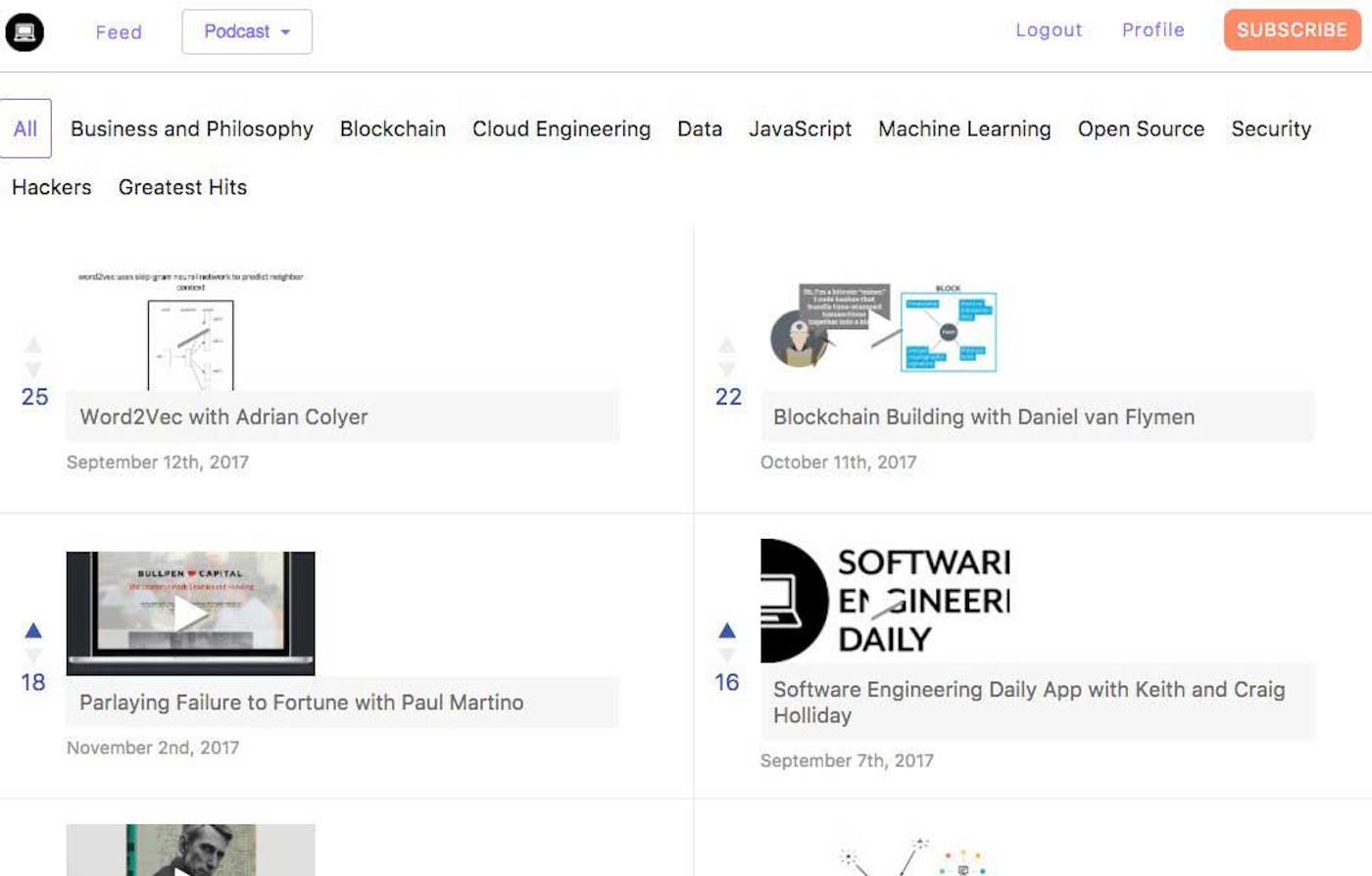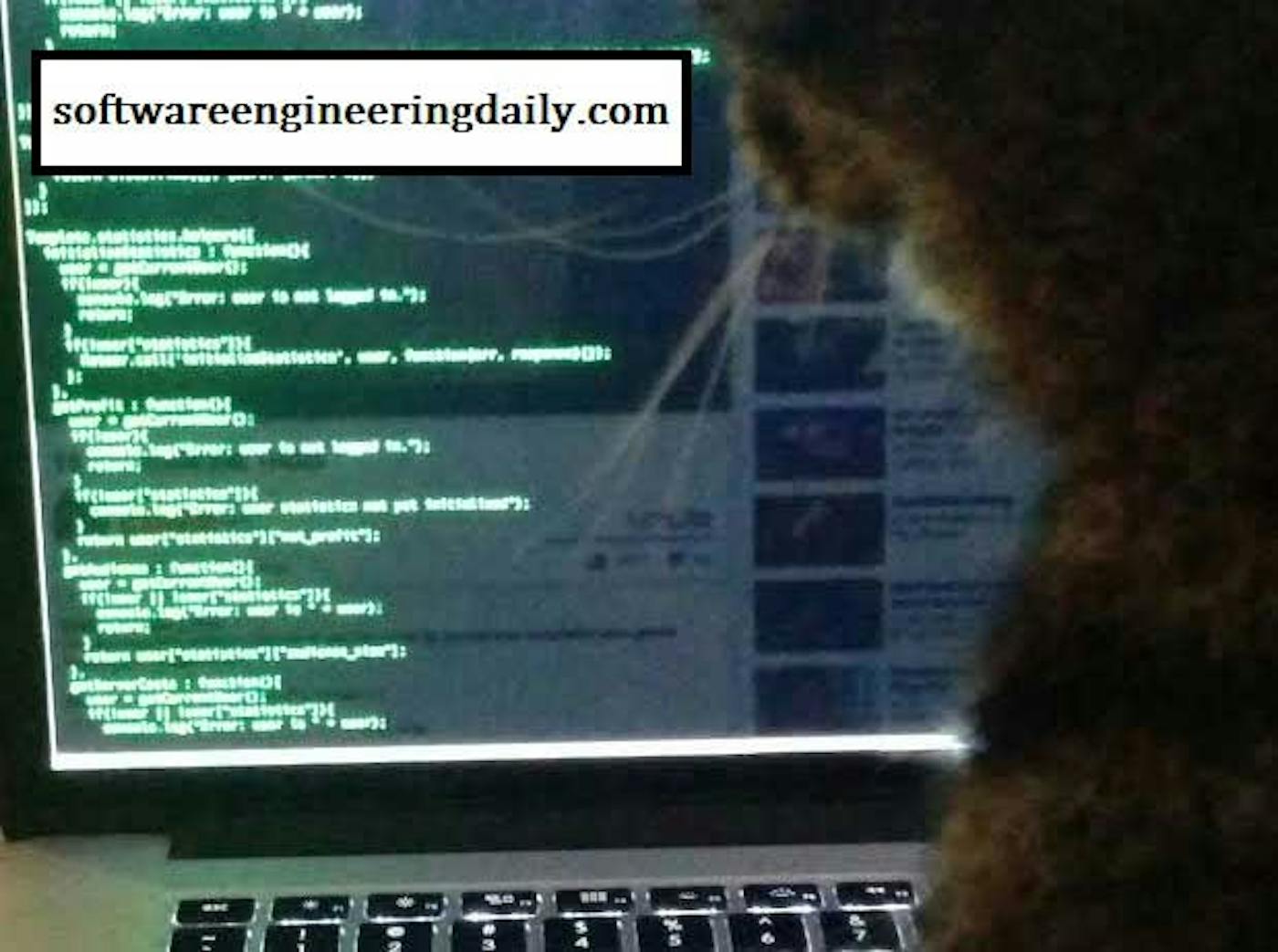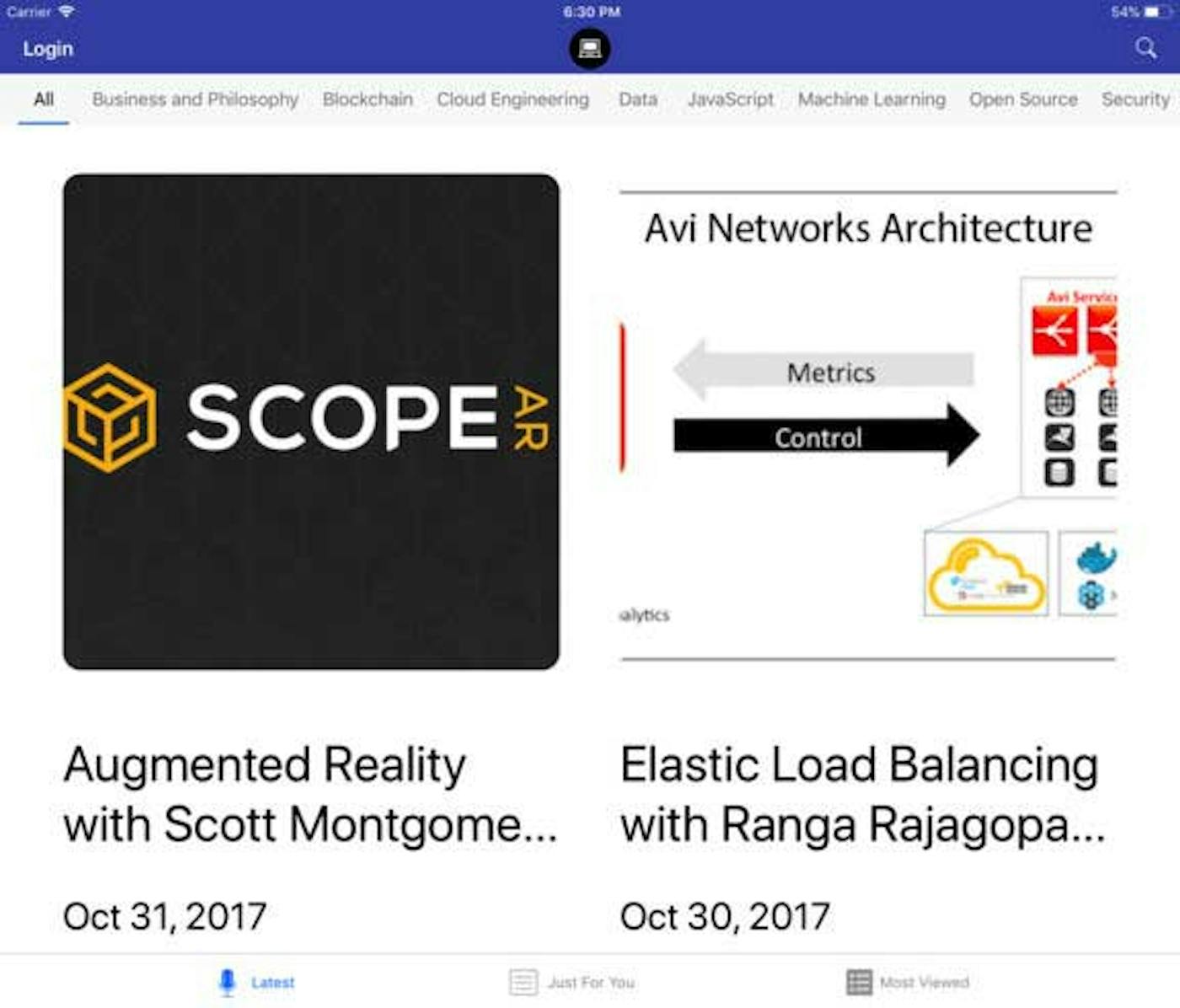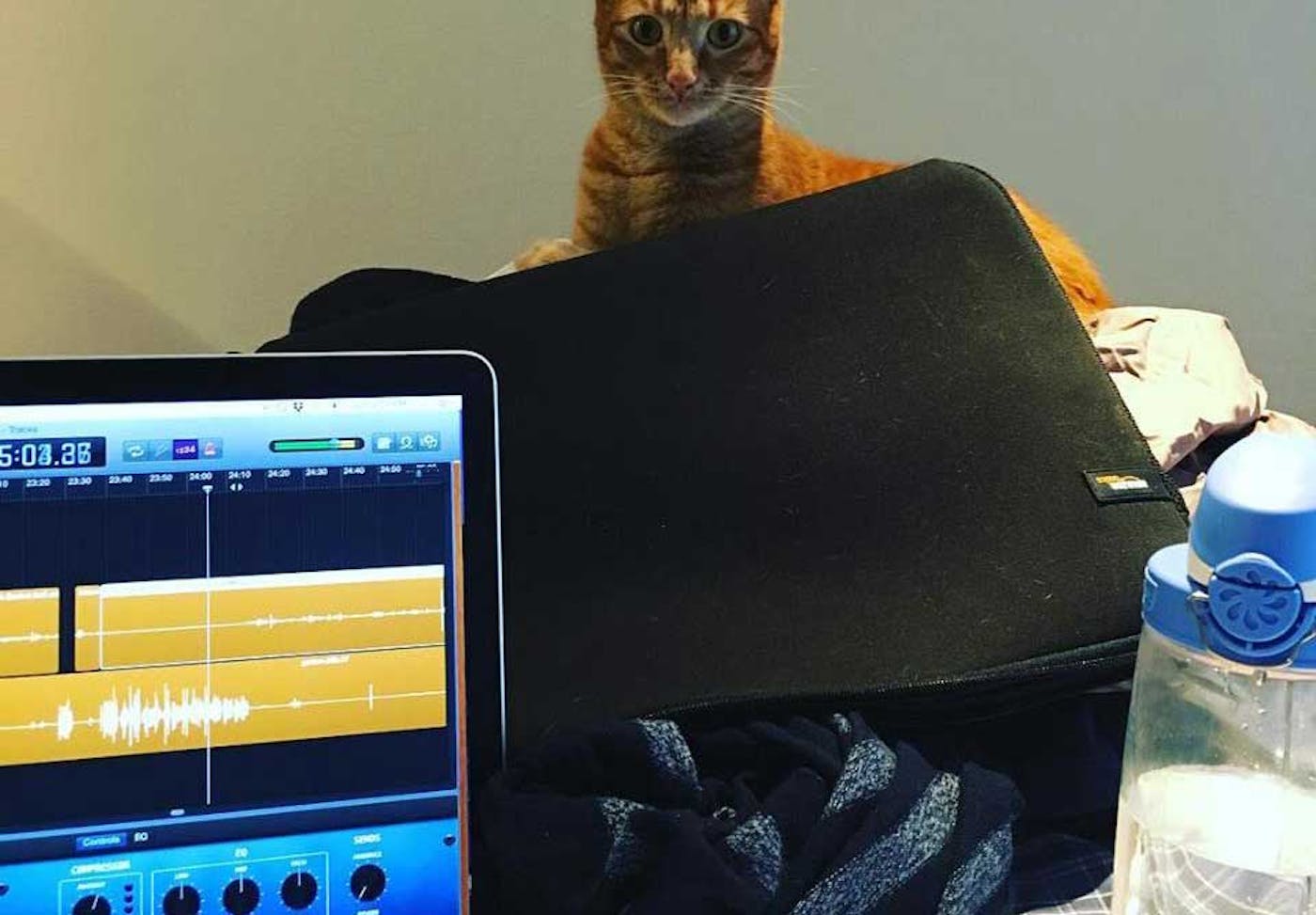Growing a Profitable Podcast on Software
Engineering
Hello! What's your background, and what are you working on?
I'm Jeff Meyerson, the host of Software Engineering Daily. I grew up playing poker competitively and studied computer science in college. I love writing music.
Software Engineering Daily is a daily podcast about software topics. Each episode is ~60 minutes and focuses on a specific technology, company, or idea. Our goal is to provide education and entertainment to the listeners.
SE Daily gets ~140,000 downloads per week, and we sell $60,000 in ads during a good month.

What motivated you to get started with Software Engineering Daily?
I apprenticed under Robert Blumen, the editor of Software Engineering Radio. SE Radio is the longest-running podcast about software engineering. During the time I volunteered for SE Radio, I saw how passionate the listener base was. An average episode of SE Radio gets 50,000 downloads.
In 2015, I frequently ran out of engineering podcasts to listen to. There just wasn't enough software engineering podcast content.
What went into building the initial product?
SE Daily was inexpensive to build. I used a cheap WordPress host, a cheap microphone, and free audio editing software.
Before I left Amazon, I had the first 15 interviews scheduled. The interview topics included ReactJS, Bitcoin, and Apache Spark — and I had no experience with any of these technologies.
But that is OK — as a podcaster, you don't need to know the right answers. You just need to have good questions. My days were spent studying the unfamiliar topics.

I took long jogs listening to This Week In Startups and James Altucher. I ate baked chicken, broccoli, and sweet potatoes for every meal. I fell in love with a militant routine.
The early days felt so good. I had 60% conviction that this podcast could turn into a business. The downside risk was minimal. Worst-case scenario I would learn a lot. I was in "flow state".
I'm grateful that some big names were willing to come on my podcast early on: Stephen Wolfram, Seth Godin, Matei Zaharia, Andreas Antonopoulos. These interviews boosted our popularity.
After we validated the revenue model, Pranay Mohan joined me full time. Pranay helped establish the long-term vision for SE Daily — our map to moving beyond the podcast. After he helped get our flywheel spinning, he left to go work for Snap as an engineer.
How have you attracted users and grown Software Engineering Daily?
In July 2015 I posted the first episode of SE Daily. Since launch we have posted an episode most weekdays. Word of mouth has been our main growth source.
| Month | Listeners |
| Sept 1, '15 | 1060 |
| Jan 1, '16 | 2580 |
| May 1, '16 | 4416 |
| Sept 1, '16 | 17675 |
| Jan 1, '17 | 22546 |
SE Daily is a two-sided marketplace. One side of the marketplace is advertisers, the other our community. We try to bring those two sides together harmoniously.
Erika Hokanson joined in 2016 and has scaled our business on every dimension. Erika sees weaknesses and opportunities in SE Daily which I am blind to.
We love to get feedback and criticism from our listeners. We work closely with advertisers to make sure we are meeting their needs.
We take inspiration from high-quality, durable media companies. We don't mind growing slowly. The longer it takes for someone to find us, the more content we will have when they do.
A notable expansion has been our open source project. It was started by Keith and Craig Holliday, who are prolific open source developers. It has snowballed into a community of contributors.
What's your business model, and how have you grown your revenue?
SE Daily is mostly ad supported. Our iOS, Android, and web apps allow listeners to opt out of ads by paying $10/month or $100/year. We use Stripe for subscription payments.
At the beginning, Hired and Digital Ocean both took a risk with SE Daily. When I sent them an email, we were under 2,000 listeners. They tested small campaigns (~$2,500 each) and saw positive results. Other direct response brands like Wealthfront followed shortly after.
Over time we have developed outbound and inbound sales. Our advertisers have many choices where to spend their money — we need to make sure that they have a good experience and ROI from SE Daily.
Our monthly ad sales have variance, usually falling between $30-60k. We focus on selling to technology companies.
Podcast ads are an uncommon ad unit, so we need to explain how it works and why it is powerful.
Our monthly ad sales fall when we fail to deliver value to our advertisers. Or when we lose focus, or get overconfident.
| Month | Revenue |
| Jun '16 | 18000 |
| Sep '16 | 31100 |
| Jan '17 | 36000 |
| Apr '17 | 44100 |
| Jun '17 | 52500 |
| Sep '17 | 35100 |
| Jan '18 | 64000 |
What are your goals for the future?
Producing high-quality content remains the focus of SE Daily. From that core competency, we tinker with adjacent businesses.
Jason Bautista joined us full time as a software engineer and designer. He is an engine of creative expansion — a da Vinci type who has a wellspring of ideas, but also the discipline to materialize singular features.
The Software Daily open source project is a place for people to socialize and collaborate on software. We welcome anyone who is looking to build software — engineer or not. Expert or novice.

Personally, I have two other projects: Adforprize and my music. Adforprize is a marketplace for creative videos. In music, I'm working on my 6th album.
What are the biggest challenges you've faced and obstacles you've overcome? If you had to start over, what would you do differently?
My years playing poker in high school and college were formative. Poker was a good way to learn about myself — to explore risk, psychology, and math. Poker exposed me to the variance of the universe, and let me sample the pain it can bring.
When I was 19 there was a month when I played poorly and lost ~$250k. This was money that I had built up from $100. I quit shortly after that. It took me awhile to recover my psychological bearings.
After I quit poker, I felt lost for the next two years. Luckily, I was in college, which is a good place to be lost in. I tried out several majors. Finding computer science gave me something new to be excited about.
If I had to start over I would prioritize health — exercise, diet, sleep, socialization, getting outside for fresh air. I would be nicer to those who love me, and try to opt for kindness over cleverness.
Have you found anything particularly helpful or advantageous?
I have a mental library of people that I am trying to understand. I like to imagine the world through their eyes.
Many learners like myself are turning away from studying books and turning towards studying people.
Books offer a condensed manifesto. With Twitter, podcasts, and YouTube you can get a kaleidoscopic view of a person's total idea set.
By focusing on people, you get exposed to their beliefs, habits, diets, exercise routines, conversational tactics.
It's useful to explore the "intellectual dark web": Sam Harris, Joe Rogan, Jocko Willink, Tim Ferriss. The business equivalents are people like Peter Thiel, Jason Calacanis, Vitalik Buterin, Auren Hoffman.
Posters around my apartment have long-term thinking aphorisms: "Get rich slow," "If you don't know what you want you are unlikely to get it," "Begin with the end in mind."

I enjoy healthy mind expansion activities: cooking unintuitive meals, sampling trendy exercise routines, encouraging taboo conversations.
I got extremely lucky with my parents. My mom is an entrepreneur. My dad became a doctor because he likes to talk to people — he taught me to ask questions. They gave me all the tools I need to succeed.
Finally, my friend Edaena Salinas has encouraged my creativity since college. Having a friend who will take you seriously and believe in your artistic/entrepreneurial ideas really helps. She now runs The Women in Tech Show and is inspiring many more people.
What's your advice for indie hackers who are just starting out?
You are special. We need you. There is something unique inside of you that nobody else can create.
Push yourself harder. Exercise more. Take in more information. Run more experiments. Build convictions about what you hold true. Adopt the "9-9-6" mentality of the Chinese tech workforce. (Work from 9am to 9pm, six days a week.)
Have a long-term vision. Determine where you want to be in 10 years, and work backwards from that goal until you get to the present.
Robert Greene and Seth Godin are my author picks for someone starting out. Listen to some podcasts/YouTube interviews with them. If you like that material pick up Mastery or Icarus Deception.
Where can we go to learn more?
- the_prion and software_daily on Twitter
- Software Engineering Daily
- The Prion on Spotify and on SoundCloud
- Adforprize is a platform for creative video advertising
I love to connect with new people. Please reach out if:
- you have feedback on SE Daily (or if you want to advertise with us)
- you want to collaborate on music
- you have experience with online advertising
Please ask questions or offer feedback in the comments below.

Hi there, let me know pls if you still need online marketing help. I sent you an invite on LI. Thx!
How to contact you to advertise in your podcast?
Email [email protected]! Thanks!
Hi Jeff, pls rename your podcast so you dont have to keep up with the name and daily podcasts :)
I can't keep up. Dont want you to burn out.
I can really hear the SERadio influence in the detail you go into.
Also please find your opposite in a cohost, even guest co-hosts. I really enjoyed your interview with Adam Of Changelog.
Why subscriptions over something like Patreon? Imho ads are part of the listening experience.
I do need a co-host!
Very glad you can hear the SER influence. It's an institution I hope to live up to.
Patreon felt wrong to me because SED does not need additional contribution. I feel like I owe more value to the listeners because I love what I do. And we will be adding more value in the coming months with some new features.
If you want to support the show you can also buy the sponsoring products! That is actually very helpful to us.
Hi Jeff! This article was really motivating for me! I run a small web development tutorials site / blog over at https://codetheweb.blog . I really want to find some way to monetise it so I can pursue it further and turn it from a 'hobby' into a small business. However, I currently only have ~1,800 visitors per month and ~100 people on my mailing list. So as you can imagine, it inspired me a lot to hear that you were able to get a sponsorship with only ~2,000 listeners!
It'd be really awesome to know how you managed to do this, and if there are any techniques I should use to make it happen myself! Also, what do you think of blogging / writing as a platform compared to podcasting? With me I don't feel that comfortable inviting people in for interviews and having my voice out there like that and much prefer writing. I'm wondering, is this a disadvantage? Would you say that podcasting is waaay better than blogging or writing?
Thanks again, this article has been very inspiring to me along my journey. ☺️
I like podcasting because it is less well understood how to podcast well, so there is less competition.
Both blogging and podcasting are great.
I would try to find some competitive advantage to differentiate you sharply from other writers/podcasters.
Any ideas on how to make it more appealing to possible sponsors and how to approach / find them? Thanks :D
I wouldn't have thought a SWE podcast be a viable business, but after reading your article I see what a great opportunity it is for software business to market themselves through your show.
$250k loss is a horrible down swing, sorry to hear. Was that all previous winnings or did you have investors backing you?
That was previous winnings.
You know i'm a fan :) Congrats on finally getting on IH! Who said you weren't an Indie Hacker!
Hey Jeff,
Just want to say that I really enjoy your podcast + the variety of topics you've covered including ones where you're not already deeply aware of the technology.
Appreciate it and all of your work!
Thanks
How do you find your advertisers?
Excellent success. Well done. I love that you've been successful, but I often hear these success stories, see a blog post about how you (roughly) did it, and then... nothing.
Using the revenue you're earning, what have you done to put back into the communities that have made you a success? Communities like Reddit, Hacker News, and Indie Hackers (the people, not the websites/platforms themselves) are no doubt part of your success story in some way -- how about putting some of that money back into the people and offering, say, to cover a year's worth of ConvertKit costs for anyone with an established business plan?
Just a thought
I have no doubts I'll receive negative comments, downvotes, and other put downs for my comment, and that's fine. I just wish people would share the love more: we've all got ideas we want to change the world with, but sometimes we just need that $500 investment that help us out.
(For the record, I'm FAR from in need of that investment.)
He's put back into the communities by giving them useful content once every day for free, for a long time.
To your point, the sentiment is noble, but I disagree. There are free tools for everything and then you can grow into ConvertKit over time.
Can you point me in the direction of a free landing page solution that does what ConvertKit does? I've been looking around for something like that.
I meant giving back financially. We all contribute to OSS projects and give advice here and there.
Great read, love the transparency! What caused the big jump in subscribers after May 2016?
Probably a combination of improved audio quality, better understanding of what I was talking to people about, word of mouth.
Wish I had more causal understanding.
I respect people who can publicly admit that they don't exactly know where some outcome came from.
(This happens all the time but seems to be rarely discussed in the open.)
Why was Digital Ocean/Hired willing to spend $2,500 when you only had ~2,000 listeners? More than a dollar/listener sounds really high.
Did the campaign run over multiple podcasts? Could you sell them on a smaller audience being "more engaged"? Something else?
It ran over several episodes.
Podcast advertising is not about CPM--it is about conversion, so the first transaction is often to test conversion.
Thanks. Whenever I read about podcast advertising it seems to be quoted in CPMs. Is that just a quick hand reference for that isn't actually used?
(I get that most podcast ads are for direct marketing so it makes sense that conversion is what advertisers care about, just trying to bridge my disconnect.)
Yeah, it's one of those things where CPM is a baseline to get things off the ground with an experimental buy.
Then over time negotiations happen.
"9-9-6" sounds like a terrible work/life balance. How do you manage with that?
I'll admit--I have dealt with some burnout.
I think 9-9-6 can be a great way to get started if you have found a decent flywheel. But there can be a big cost.
I have not perfected my work habits. I have resolved this year to spend more time with my family, for example.
What really helps: exercise, sleep, diet. I never compromise on those things if I can avoid it.
Nobody I know that is successful at work is "balanced". Courtland has cheerily said on the IH podcast that he works all the time. He's not being ironic--he has found product/market fit and is working tooth and nail to hold onto it, because it feels so gratifying.
As Bezos says, what we are looking for is "work/life harmony" not work/life balance.
Most of us knowledge workers live in a state of permanent vacation relative to how people worked a century ago. I remember reading "The Jungle" about how all these people had to trudge through snow to work in meatpacking plants where sometimes their fingers got chopped off, or their ears froze off of their face.
And there are people all over the world that still have to work like that. They work 9/9/6 mining the materials that make our iPhones. I have a combination of gratitude for those people, and guilt that makes me feel like I cannot slow down. To slow down is to be ungrateful.
Selection bias at work (literally). Our revenue is bigger than yours, and we have 30-40 hour work weeks (less for me, I've got a chronic illness). Many businesses like Wildbit, Basecamp, Egghead, Basis (Stephanie Hurlburt) and indie acts like Paul Jarvis, Nick Disabato, and more — these are just off the top of the head, people I directly know — have written, spoken, tweeted, and podcasted about their totally normal, even shorter-than-40-hour work schedules. Of course, "we don't work long hours" doesn't have quite the story hook.
Feeling guilty when you don't work is something that you can overcome, and you will be healthier for it. Overwork causes real physical and psychological tolls that you cannot escape with diet and exercise. And if you are unlucky (but not rare), and it activates something hidden in your genome such as a latent tendency for an autoimmune disorder, you will suffer a health consequence that will stick with you for the rest of your life.
ETA: We never worked "9-9-6," not even in the beginning.
For people who have not found their Indie Hacker dream yet, I think it makes sense to find something (almost anything) to lean into and work super hard at.
Maybe it is studying blockchains. Maybe it is studying SaaS companies. Maybe it is just going to the gym constantly and trying to get healthier/stronger.
The 9-9-6 was advice specifically for people who are getting started. When I was an "Indie Hacker" without a clear path, I had all of this anxious energy and didn't know where to direct it. So I worked really hard on all kinds of dead-end projects.
I gave up on most of those projects, but kept the relentlessness and the regularity of those work habits.
It's worth pointing out that a daily podcast about software engineering is just an operationally intensive business. There's no getting around it!
I strongly advise software engineers to build software businesses, NOT media businesses.
I'd offer a counterpoint that it is absolutely possible to be successful and remain in balance. See: Basecamp.
Definitely! To each their own.
This comment was deleted 4 years ago
Thanks for listening Xchai! If you have any feedback or recommended topics for SED don't hesitate to reach out.
SE Daily: 80%
Music: 10%
Adforprize: 10%
I'm trying to spend 1-2 hours early in the morning on music lately.
Music helps me with SE Daily because it is effectively programming. Adforprize helps me with SE Daily because I am architecting a product, making some hard tradeoffs, and selling.
They feed into each other in interesting ways--so there's not a clear delineation of time spent.
Hey Jeff,
First off, great interview!!
In the interview you said "My days were spent studying the unfamiliar topics" can you expand on this? did you read a bunch of studies or papers or something else?
Any advice for someone considering starting a podcast?
Here's a quick guide to starting your own podcast:
Choose the right topic:
Everyone wants to rush out and buy a microphone, but the first thing you need to do is pick a topic. Ask yourself:
A good tool for researching topics, and seeing where there might be opportunities, is Cast.Market. It will allow you browse iTunes categories, and see how different shows rank within those categories.
Record a practice episode:
Before you buy a microphone and other gear, follow these steps:
In the beginning, that you'll be rusty! You'll stutter. You won't like the sound of your voice. You'll have big gaps and silences. That's OK! That's why you need to practice!
Podcast gear:
Now that you've practiced, you're ready to get your gear. Here's the starter kit I recommend:
Podcast hosting:
Lots of folks don't realize that Apple Podcasts doesn't host your MP3s, your feed, etc... For hosting you’ll need:
My new company (Transistor.fm]) does both of those things. If you're looking for a good free option (especially good for personal podcasts), check out Anchor.
Nice interview and advise. I love Anchor. It's free and very easy to use!!
I've learnt a ton about podcasting from Cliff Ravenscraft over at cliffravenscraft.com formerly but still well known as The Podcast Answer Man
Thanks Justin!! I appreciate it!!
I watch a lot of YouTube videos, read whitepapers and documentation, and closely read the relevant people on Twitter. If there is something I am really confused about I set up a call with someone, or send an email.
Best advice for starting a podcast: prepare. Don't do it on the fly. Map out the conversation you want to have in your head before you have it.
It's like playing Poker or Magic or other 1 on 1 intellectual pursuits. You want to think 2-3 steps ahead of where the conversation is headed. You want to map out where you want to go with the conversation, and guide the interviewee in that direction with a soft touch.
Thanks Jeff!!
Love the podcast!! You being on IH is like internet inception since I first discovered indie hackers from the SE Daily episode on it!!